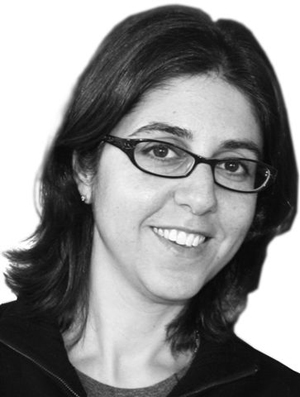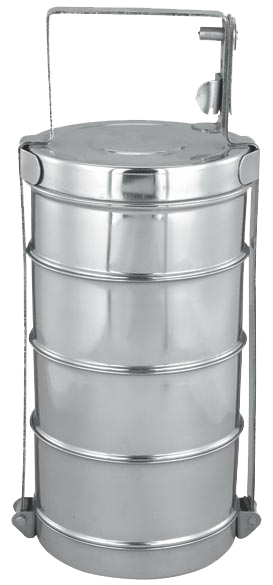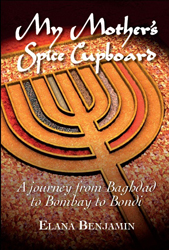Join a community of readers who are committed to Jewish stories
Sign up for JBC’s Nu Reads, a curated selection of Jewish books delivered straight to your door!
Elana Benjamin is an Australian freelance writer. In 2014, her work has been published in major Australian publications including The Sydney Morning Herald and Sunday Life magazine. My Mother’s Spice Cupboard is her first book. She is blogging here today for the Jewish Book Council and is available to speak to book clubs through JBC’s Live Chat program.
 “Will there be leftover chapatis for me to take to school tomorrow?” my daughter asks. It’s 5:00 PM and I’m preparing dinner, hurriedly rolling dough into imperfect circles. “You can have two for your lunchbox,” I reply. But that’s not enough. She requests another chapati. Although I’m certain she could eat a third Indian flatbread, the extra one’s not for her. It’s to distribute among her closest friends.
“Will there be leftover chapatis for me to take to school tomorrow?” my daughter asks. It’s 5:00 PM and I’m preparing dinner, hurriedly rolling dough into imperfect circles. “You can have two for your lunchbox,” I reply. But that’s not enough. She requests another chapati. Although I’m certain she could eat a third Indian flatbread, the extra one’s not for her. It’s to distribute among her closest friends.
My mother often made delicious chapatis for my brother and me when we were children. She intended them to accompany one of her bhajis – perhaps spinach, or cauliflower and potato. But neither my brother nor I had an appetite for spiced vegetables. Australian-born junglees, we preferred to devour our warm, slightly chewy chapatis doused in butter, cinnamon and sugar; our own Indian-pancake creation.
But Mum never packed chapatis for our school lunches. My lunchbox staple was a peanut butter and honey sandwich on white bread, cut into two identical triangles. It was pauper’s fare compared to the hot, hand-delivered meals which my mother feasted on thirty years earlier as a Bombay schoolgirl.
The movie The Lunchbox has been screening in cinemas around the world. It’s the story of a mistaken delivery in Mumbai’s remarkable lunchbox delivery system. But these are no lunchboxes that a Westerner might imagine.
Termed dabba in Hindi (and also known as tiffins), they are cylindrical metal canisters comprising stackable containers which clip together with a handle. Each container is filled with a different food item to make a complete meal (for example rice, meat and vegetables). The dabba is transported around Mumbai by a network of approximately 5,000 delivery men known as dabbawallahs. Every working day these dabbawallahs – most of whom are only semi-literate – transport more than 130,000 ‘lunchboxes’ all over the city.
In 1950s and 60s Bombay (now Mumbai), my grandmother spent her mornings cooking elaborate meals for her family’s lunch. Her deadline was the dabbawallah’s arrival at the entrance of her apartment building. Each day, he came to collect three dabbas: one for my grandfather in his city office, the rest to be delivered to my mother and her siblings at school.
My mother’s dabba was already waiting when she arrived at her designated seat in the lunchroom of her all-girl Catholic school — even during the heavy rains of the monsoon season. One container was always filled with rice, but my grandmother’s cuisine otherwise varied. Sometimes it was meatballs with beetroot. Other days her menu featured chicken and okra, or dhal and chapati.
 When she’d finished eating, my mother packed up her dabba and left it on the table to be collected by the dabbawallah and returned to my grandmother for washing and the next day’s use.
When she’d finished eating, my mother packed up her dabba and left it on the table to be collected by the dabbawallah and returned to my grandmother for washing and the next day’s use.
Many of my mother’s fellow students also received dabbawallah-transported lunches. But Mum was one of only a handful of Jewish girls in a school which numbered over a thousand. Her family strictly observed Judaism’s dietary laws, so it was imperative that her meal wasn’t mixed up with another, non-kosher lunch. Yet my mother never received the wrong dabba. Indeed, a Harvard University analysis concluded that only one in a million dabbas is ever delivered to the wrong address.
My mother left this world behind when she emigrated from Bombay in 1966, eventually settling in Sydney in 1970. Busy building a new life in Australia, my parents didn’t dwell on the past. My mother never explained the significance of the metal canister with three containers which sat in the corner cupboard of our kitchen. She didn’t tell me stories of the dabbawallahs and the lunches they’d delivered to her. And yet, my parents’ native India was the invisible lodger in our Bondi home.
Despite their English mother-tongue, my parents regularly switched to Hindustani to convey secret adult messages (“bacha lok ka samne mat bat karo” – “don’t speak in front of the children”). We shopped for groceries at the local supermarket, but also made regular expeditions to ‘Eze Moses’ – one of Sydney’s earliest spice shops. In the pungent-smelling aisles, we stocked up on sacks of basmati rice, bags of lentils, jars of brinjal (eggplant) pickle, and the item I coveted most – tall bottles of hot pink, rose-flavoured syrup. Foods which were unseen and unheard of in the kitchens of other families I knew.
I quickly learned the dances of blending in and belonging. Kotmir and piala chai were for home. ‘Coriander’ (cilantro) and ‘cup of tea’ were for out. Fresh young coconuts – if my father could get track them down – were for home. Coca Cola and lemonade were for out. Like a chameleon, I commuted between my two worlds, never mentioning chapatis, rose cordial or coconut water outside the house.
I shouldn’t have felt this tension – almost all my friends were Jewish, just like us. But in many ways, they weren’t like us at all. Most were unfamiliar with the existence of light-skinned Jews from India whose ancestors were Arabic speakers from Iraq.
 Yet my nine-year-old daughter has a different approach. For her, our differences are to be embraced, not concealed. Sherequests extra chapatis to share with her friends in the playground, and eagerly shows off her ability to count in Hindi.
Yet my nine-year-old daughter has a different approach. For her, our differences are to be embraced, not concealed. Sherequests extra chapatis to share with her friends in the playground, and eagerly shows off her ability to count in Hindi.
The current generation of children are growing up with vocabularies which include ‘multiculturalism’ and ‘diversity’. Supermarkets flaunt aisles brimming with international food. And Indian movies are shown in mainstream cinemas, prompting me to tell my daughter the story of Mumbai’s remarkable dabbawallahs and their role in our family’s history. Wide-eyed, she listens intently. And finally, I am not embarrassed by my unique heritage, but deeply proud.
Elana Benjamin holds an Arts/Law degree (History major) from the University of New South Wales. She lives in Sydney with her husband and two children. Read more about her at http://www.elanabenjamin.com/.
Related Content: